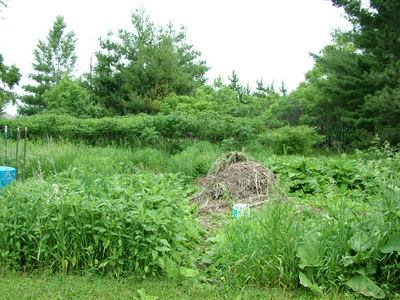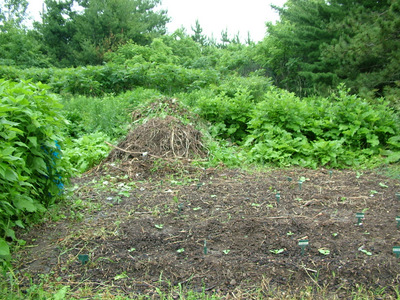As a believer in a purer meaning of organic and sustainable, and opposed to the mistaken path of the corporate food system, I know the insane war on weeds cannot be won with chemical warfare. In fact, if weeds have to be killed, hand-to-hand combat is the only solution. I do not make war on weeds, but integrate their growth into my gardening system. My vegetable garden is a testing ground where I’m constantly confirming that it is logical to use weeds as my major compost ingredient. Rather than growing an assortment of specific compost crops, I just harvest my weeds and compost them on a large scale.
This picture shows my compost area. Burdock is the dominant weed, but there are also lots of nettle, some dandelion, various grasses and all the other wild invaders that some gardeners consider a plague, but I look at it as free food for my veggies. Well, almost free. There is a lot of labor involved in harvesting.
The nutritional value of composted weeds like burdock, dandelion and nettle is well documented. I crank out weed-based compost in copious amounts, and I am pretty happy with the results. My clay soil is constantly improving in tilth and apparent fertility.
I cleaned out this area over the weekend so I could plant some squash, pumpkin and melon seedlings. I had no place ready to go in the regular garden beds for Hubbards and other large squash, and I thought it might be a good idea to let some of the trailing squashes head out from here into the wilderness behind. I’ll trellis some of the smaller climbers that I planted closer to the front of the bed.
When an area of my garden gets overrun, my quick clean up tools are a camping hatchet and a kama (a small hand axe developed in Okinawa, so sharp and deadly that it is actually in the kung-fu arsenal of weaponry). With those tools I can quickly knock down almost everything standing. I remove the residue to the compost pile, then use a garden fork and a CobraHead to do the root and small weed removal.
Here is the same area after I cleaned out the burdock and planted the cucurbits. The harvested burdock and other plant material are atop the compost pile in the rear of the picture. I’m quite happy with the idea that I don’t spend any money on fertilizer or herbicides and that my garden is a fairly closed loop as far as inputs go.
I do a lot of scalping standing up. That helps a lot. I use a variety of good hand tools for different weeding situations. The raised bed system I employ also helps as the plant growth from the crops does smother out weeds as the plants mature. I totally cover the beds in fall with leaves which cuts winter weed germination and some of the leaves are raked into the aisles of the beds in the spring to form a mulch there. My garden is very large, yet I find that I can keep weeds (mostly) under control, and if they do get out of control, I can reclaim the overgrown areas without exhausting effort, as I explained above.
Since my very relaxed composting process is not cooking all the weed seeds dead I have no choice but to be a diligent weeder. I do not find the task overwhelming or consuming, but the weeding has to be done continuously spring through fall.


